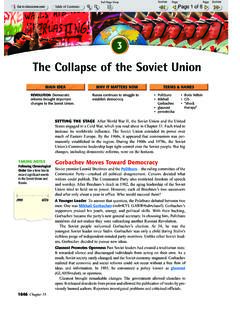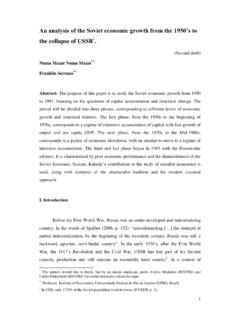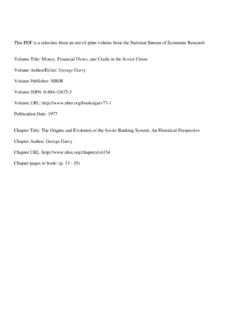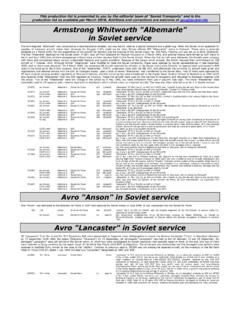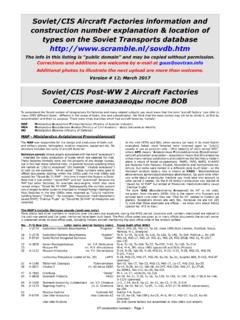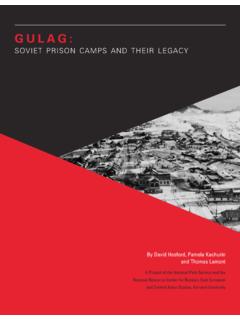Transcription of “Commemorating “The Deportation” in Post-Soviet Chechnya ...
1 Commemorating The Deportation in Post-Soviet Chechnya . The Role of memorialization and collective memory in the 1994- 96 and 1999-2000 Russo-Chechen Wars. in History and memory . Studies in Representation of the Past. Volume 12, No. 1. Spring/Summer 2000. by Brian Glyn Williams. Univeristy of London. The collapse of Communism in Eurasia has led to many events that few analysts in the West could have predicted during the Cold War. One of the most improbable of these events was the stunning military victory of the tiny autonomous republic of Chechnya in the 1994-1996 war for independence against the Russian Federation. In a David versus Goliath struggle, bands of Chechen fighters took on the might of the Russian army, often in open warfare, and over and over again defeated or outmaneuvered Moscow's better equipped, larger, professional armies. While the former head of the Russian army, Defense Minister General Pavel Grachev, boasted he could overwhelm the Chechen separatist "bandits" with one air battalion in a matter of hours, the Chechen debacle demonstrated to the world just how far the Russian army's battle effectiveness had deteriorated.
2 While the Chechens can officially claim to be victors in the first Russo- Chechen war of the 1990s, there was in actuality no winner in this bloody conflict. Scores of Chechen villages were destroyed, the Chechen capital of Grozny was bombed to rubble in the heaviest bombardment in Europe since the bombing of Dresden, tens of thousands of Chechens and Russians living in Chechnya lost their lives, hundreds of thousands more were made refugees, and the economy of the independent statelet of Ichkeria, as Chechnya is now known, lies in utter ruin. Rather than accepting autonomy within the Russian Federation, as the Republic of Tatarstan has, for example, the Chechen people rallied behind such leaders as Dzhokhar Dudaev, Aslan Maskhadov and Shamil Basaev, and chose to fight the might of transcontinental Russia in a bitter struggle for total freedom. The heavy cost of this independence for the Chechen people has been incalculable.
3 If the destruction from the first Post-Soviet invasion was not sufficient, the majority of the tiny Chechen Republic's infrastructure which was rebuilt after 1996 was totally obliterated by Russian bombing raids and artillery bombardments in late 1999 and early 2000 that surpassed even those of the previous war in their intensity. As of spring 2000 the Russian army is engaged in an even more destructive second invasion of secessionist Chechnya , and few in the Kremlin appear to have learned from the lessons of the first war. Despite the losses in life to their own soldiers (the Russian government admits the loss of approximately 2,000 soldiers thus far in this second campaign, a number seen as rather low by most outside analysts), the Russian government seems determined to avenge its defeat in the previous Chechen War. To stunned Western observers who are watching Russia engage in total warfare against citizens it claims as its own, the second Chechen War has all the logic of an American invasion of Vietnam to avenge its defeat at the hands of the Viet Cong.
4 Not surprisingly, the collective amnesia concerning the losses in the first bloody Chechen conflict which prevails in Russia today offers a stark contrast to the Chechens' salient collective memory of previous losses and oppression suffered at the hands of their Russian foes. While much has been written on the Russian government's reasons for launching the second post- soviet Chechen War (in particular much has been made of Russian Prime Minister Vladimir Putin's desire to exploit the war to curry favor with a growing nationalist movement in Russia), very little attention has been paid to Russia's opponents, the Chechens, or their reasons for twice going to war with the Russian army. Blithely described as "terrorist bandit formations" by the Russian press and casually dismissed as an "internal problem" by Western politicians more intent on courting the new Russian leadership than preventing mass human rights abuses, the Chechens as a people have been largely overlooked by those following the recent war.
5 Those who do study the Chechens tend to attribute their stubborn resistance to the Russians merely to their centuries-long tradition of warfare with the Russians. While there is a certain validity to claims of this sort, it will be shown here that it is in fact the collective memory of the more recent ethnocide this small people experienced at the hands of the soviet government in the 1940s and 1950s that has provided the primary catalyst for the militarization of this Muslim society in the postSoviet context. The Roots of the Russo-Chechen Conflicts of 1994-96 and 1999-Present. Analysts have partly explained the Chechen leadership's decision to enter into war with Russia in the 1990s by a martial tradition found among this Islamic Caucasian highlander people who have long been known as implacable enemies of Russia. This enmity with Russia is exacerbated by the fact that the Chechens have a culture that glorifies weapons, with strong codes of honor that often lead to blood vendettas.
6 Indeed, historically, no ethnic group on the north Caucasus flank has had as violent a history of conflict with the Russians as the Chechens.. During the course of the nineteenth century, Chechen murids (literally "students," holy warriors belonging to Sufi clan-based orders) fought a bloody war agains the encroaching Russian Empire during which many of these highlanders' villages were burnt and their inhabitants slaughtered by the invading Russian forces. The grave sites of slain murids and sheikhs (Sufi religious leaders) continued to be memorials to this struggle and sites of pilgrimage for devout Chechen Muslims through the soviet period, despite the authorities' attempts to eradicate such "primitive superstitious holdovers." Visiting the site of a murid's tomb was both an affirmation of the Chechens' Islamic identity during a period of enforced Communist atheism and a link to their revered ancestors.
7 The collective memory of Russia's brutal subjugation of the Chechens' ancestors was kept alive during the soviet period despite the fact that Chechen murids who had fought against Russia were described in official soviet texts as "fanatical reactionaries" and anti- soviet elements and "bourgeois bandits." . It was not until the mid-nineteenth century, when Russian Viceroys Vorontsov and Bariatinskii finished the task bequeathed to them by the feared General Yermolov, that the redoubtable Muslim Chechen mountaineers, the indigenous population of this Caucasian region, sullenly surrendered to over a century of rule by the Russians and Soviets. From the fortress of Grozny (which literally means "terrible" or "menacing" in Russian), Yermolov's armies had begun expelling the Chechens from the plains and into the mountains. Yermolov's famous declaration, "I desire that the terror of my name should guard our frontiers more potently than chains or fortresses, that my word should be for the natives a law more inevitable than death," is still remembered by Chechens today.
8 (1) . This long memory of conflict with the Russians certainly played an important role in many Chechen fighters' decision to take up weapons and fight against their people's historic "other" during the 1994-1996 Chechen War. However, no event in the bloody history of relations between the Chechens and Russians has had as lasting an impact on the Chechens'. collective psyche as their tragic mass deportation from their homeland to Central Asia toward the end of World War II. On 23 February 1944. mechanized divisions of the NKVD (progenitor to the KGB) surrounded all Chechen villages and brutally herded the entire Chechen population on to cattle cars for transportation from their home republic to the plains of Kazakhstan, the taiga of Siberia and the mountains of Kyrgyzstan, on the official grounds that they had collaborated with the Wehrmacht during the German invasion of the USSR. Thousands of Chechen mountaineers died on the sealed carts due to lack of water and food, poor sanitary conditions and trauma, and thousands more died in their inhospitable places of resettlement.
9 For twelve years the scattered Chechens languished as a non-nation far from their Caucasian homeland. It was only with the death of Stalin in 1953 and the rise to power of the reformist soviet leader Nikita Khrushchev that the Chechen people was permitted to return to the Chechen-Ingush Autonomous soviet Socialist Republic (ASSR), which they shared with their ethno- linguistic kin, the Ingush (who had also been deported). Although the deportations were carried out by the soviet government, and neither Stalin nor NKVD chief Lavrentii Beriia was Russian, this distinction was lost on the Chechens who saw the deportation as the "final solution" to their years of determined resistance to Russian rule. In the Chechen collective memory of the deportation, it was the Russians who carried out this atrocity.(2). The collective memory of this event has shaped Chechen identity to this day, and pundits who analyze the Chechen leadership's relations with neighboring peoples and territories (such as the newly independent Republic of Georgia, the related Ingush, the partly Christian Ossetians, Moscow and, most recently, the multi-ethnic republic of Dagestan in the Russian Federation) must take this factor into consideration when predicting the Chechens' political and military actions.
10 Interestingly, today few in the West are aware of the salient nature of this tragic event in forging contemporary Chechen society and its role in shaping this people's collective actions. An analysis of the deportation and the ways in which Chechen ethno-national entrepreneurs have exploited this traumatic event will provide a unique case study of the ways in which victimized communities are shaped in a political, cultural and social sense by memories of communal tragedy. It will also demonstrate the ways in which the memorialization of a people's tragedy can politically and militarily mobilize threatened populations.(3). THE DEPORTATION AS CONTESTED HISTORY. As in much of Eastern Europe and the Middle East, nations and ethnic groups of the Caucasus have competing ethno-national histories. The Russian population of the northern Caucasus still tends to look upon the Chechens as traitors to the soviet homeland during World War II, and many believe that the charges leveled against this people of mass treason against the USSR during the Nazi invasion were valid.


